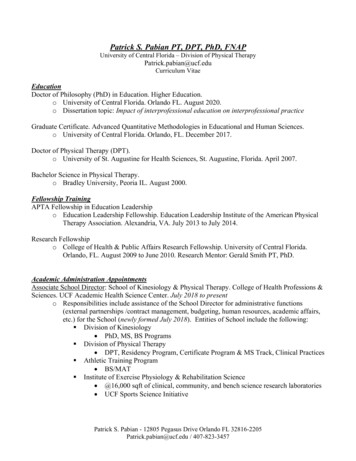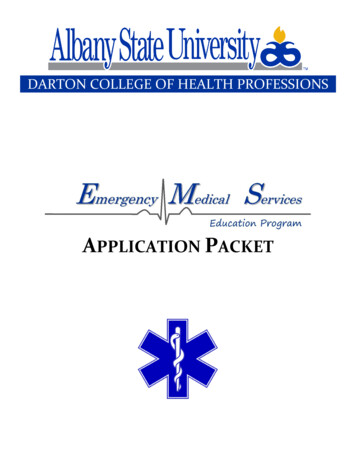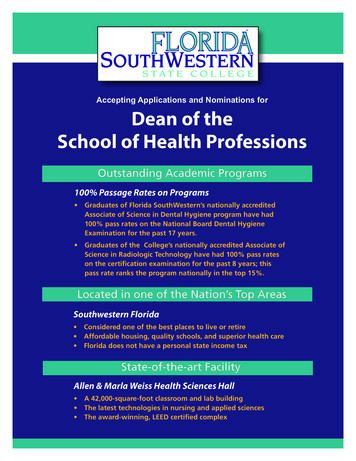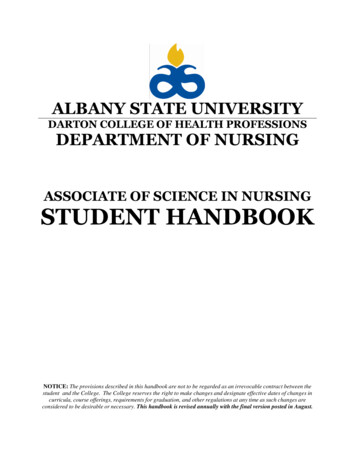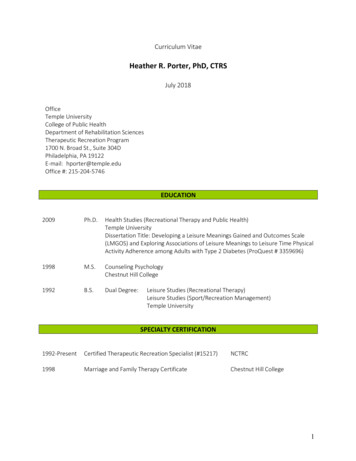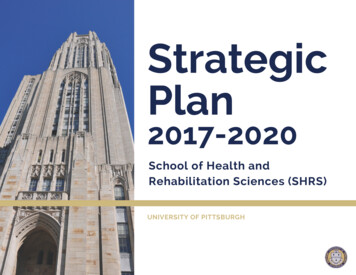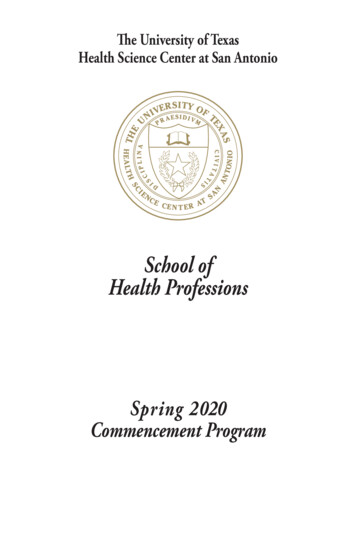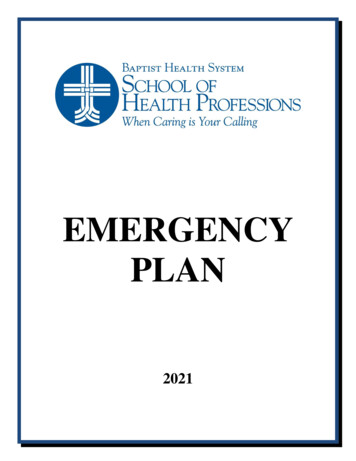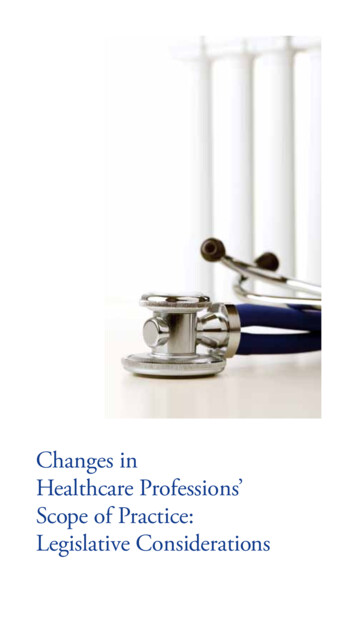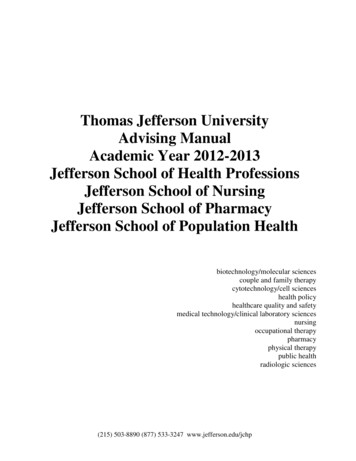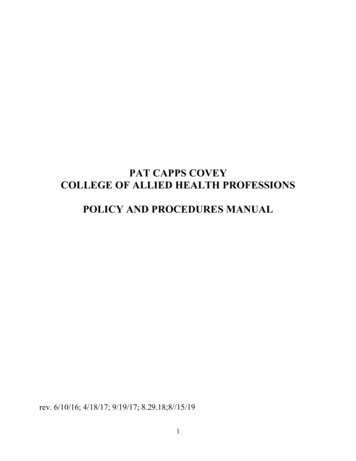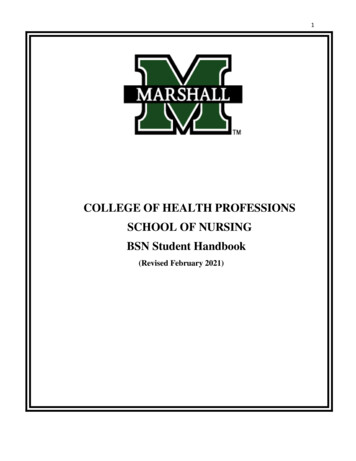
Transcription
1COLLEGE OF HEALTH PROFESSIONSSCHOOL OF NURSINGBSN Student Handbook(Revised February 2021)
2This handbook is developed for students entering the College of HealthProfessions, School of Nursing, Bachelor of Science in Nursing (BSN)program.Students are expected to read the Marshall University Catalog and theMarshall University Student Handbook in order to be familiar withUniversity policies.The Bachelor of Science in Nursing Program is accredited by the:Accreditation Commission for Education in Nursing or ACEN (formerlyknown as the NLNAC) 3343 Peachtree Road NE, Suite 850 Atlanta, Georgia30326 acenursing.org (404) 975-5000The ACEN is a resource for information on the tuition and fees, andlength of the programs
3Table of ContentsTOPICWelcome from the Chair of School of NursingLinks to Important Marshall University Policies & Academic CalendarSchool of Nursing Vision and Mission Statement, PhilosophySocial Justice PolicyBSN Learning OutcomesSchool of Nursing Admission PolicyBSN Academic Policies General Policies Withdrawal/BSN Progression/Leave of Absence Academic Dishonesty Original Work Policy/Anti-Plagiarism Policy Distance Education BSN Online Exam/Quiz Policy Pre-Licensure BSN HESI Exam Policy Pre-Licensure BSN Policy for Late Assignments/Rewriting Papers Pre-Licensure BSN Classroom Grades Policy Pre-licensure BSN Program Policy on Rounding of Grades Pre-Licensure BSN Program Comprehensive Testing Policy Pre-Licensure BSN Program Drug Calculation Rounding Policy Pre-Licensure BSN HESI Remediation Policy Pre-licensure BSN Computer Testing Policy Academic AppealsSON Communication Policies Faculty/Faculty & Student Cell Phone Policy Recording of Classes Policy Electronic/social Media PolicyPAGE567-99101112-2323-25BSN Student Health Policies/ Required Health Records Health Form Change in Student Health Status Policy Annual TB tests Vaccinations Required/Recommended Technical Standards SON Drug and Alcohol Testing Guidelines/Procedures Counseling and Other Assistance26-31BSN Clinical Requirements Clinical Times/Sites Hospital Orientation CPR Criminal Background Checks/ Drug Screening Uniforms Universal Badge Body Piercing/Tattoos & Artificial Nails32-35
4BSN Student Organizations Student Nurses Association Sigma Theta Tau-Nu Alpha Chapter Nursing Honor Society Nurses Christian Fellowship ScholarshipsAcademic Advisement and Registration Advising and Registration Core Curriculum Credit/clock hours Audit Graduation Recognition Ceremony Licensure as a RNFAQs3637-4142
5Greetings from the Chair of the School of Nursing: Dr. Denise LandryWelcome to the School of Nursing at Marshall University. We are the largest regional providerof nursing education located within a major university setting, and have access to resourceswhich provide students with unique and varied experiences. In the pre-licensure BSN programwe have campuses in Huntington and Point Pleasant, WV (MOVC). Additionally, we offer anonline RN to BSN program for graduates of accredited diploma or Associate Degree Nursingprograms. Our Family Nurse Practitioner Master’s in Nursing Program is televised to Beckley,Bluefield, Point Pleasant, and South Charleston, WV. We also have online MSN programs inNursing Administration and Nursing Education. We offer a collaborative Psychiatric MentalHealth Nurse Practitioner and Nurse Midwifery with Shenandoah University School ofNursing in Winchester, Virginia.We have a long history of excellence on the national RN licensure examination (taken by ourpre-licensure RN students) and the Family Nurse Practitioner Certification Exam. This is adirect result of the hard work on the part of our dedicated faculty who bring experience andpassion into the educational process. In addition to traditional classroom methods of instruction,we also excel in the use of innovative technologies to enhance learning, including our dynamiconline programs of study.We exist in a challenging world for all health professions, especially the nursing profession. Theneed for nurses has never been greater and will only grow with the coming years. Many studiessupport the need for more nurses, especially those with Bachelor’s in Nursing (BSN) degrees andadvanced degrees. It is the responsibility placed upon faculty to assure tomorrow’s nurses areprepared and ready to assume leadership roles and safeguard our most vulnerable populations:the ill. To this end, the faculty and I stand ready to support student achievement and education atthe undergraduate and graduate level.
6Important University LinksAcademic Calendar: to view academic calendar click on the link and select the appropriatesemester. http://www.marshall.edu/calendar/academic/Marshall University policies: Students should review the following University policies:Incomplete grade, Students with disabilities, Grade appeal, D/F forgiveness, Academicdishonesty, University excused absences, Core curriculum, and others as needed. See theMarshall University Undergraduate Catalog for the Marshall University uate-catalogs/MU online: https://musso.marshall.edu/cas/login?service 2Fbb-auth-provider-casbb iderId%3D 124 U: Click on the link to go to MyMUhttps://musso.marshall.edu/cas/login?service NCLEMENT WEATHER POLICYIf you have questions pertaining to the University being closed during inclementweather, you may call Marshall University 304-696-3170.
7School of Nursing Vision StatementMarshall University School of Nursing endeavors to be regionally recognized for innovativeprograms in nursing education, scholarship, and interdisciplinary partnerships that improve thehealth and well-being of the individual, family, and society.School of Nursing Mission StatementTo provide quality, innovative education to improve the health and well-being of the individual,family, and society.To accomplish this mission, the SON:1. Maintains rigorous professional education standards through the high expectation ofstudent learning and performance.2. Encourages involvement of faculty in service to society and the profession.3. Supports the engagement of faculty and students in research, practice, and other scholarlyendeavors.4. Provides an environment that is sensitive to a culturally and ethnically diverse studentbody, faculty, and staff.5. Maintains an environment that provides for academic freedom and shared governance.MARSHALL UNIVERSITY SCHOOL OF NURSINGSTATEMENT OF PHILOSOPHYPERSON/ENVIRONMENTThe person is a holistic being; an individual who is complex, dynamic, and cannot bereduced to the sum of his/her parts. Each person has values, attributes, and behaviors that areinfluenced by environment, culture, social norms, experiences, physical characteristics, moraland ethical constructs, and religious beliefs and practices. The person is viewed as a systeminteracting with the environment and developing relationships with others. The person is capableof growth and development, self-direction, change and goal directed behavior. Each person isdiverse and unique in nature and should be recognized as such. Diversity may occur in, but is notlimited to, race, gender, ethnicity, sexual orientation, age, socioeconomic status, religious beliefs,political beliefs, and physical abilities. Each person deserves respect and dignity.
8HEALTHHealth is a dynamic process which has variations along a wellness/illness continuumthroughout the lifespan. Wellness is the highest functional potential for holistic well-being.Illness incorporates any alteration in health which produces dysfunction or a potential alterationin the individual. Perceptions of health are determined by society and by the person. Health isinfluenced by heredity, environment, and lifestyle. Individuals ultimately have the right andresponsibility to make decisions and set goals concerning their health.NURSING“Nursing is the protection, promotion, and optimization of health and abilities, preventionof illness and injury, alleviation of suffering through the diagnosis and treatment of humanresponse, and advocacy in the care of individuals, families, communities, and populations.”(ANA, 2010, p. 3) Nursing involves integration of many values including caring, diversity,integrity, holism, patient-centeredness, and excellence. Caring is the essence of nursing and canbe described as the act and expression of compassion and concern towards others to promote asense of health and well-being. Diversity is integrated into nursing through recognition andacceptance of unique and individual differences and the beliefs, values, gender, race, andethnicities among individuals and communities. Nursing practice demonstrates integrity throughadherence to moral and ethical principles, respecting the dignity of others and providing honestand trustworthy care. Nursing is patient-centered where the patient is the focus of care and isactively involved in the process of change to enhance health. The value of holism is integratedby viewing the individual as a dynamic being and every aspect of the human condition isconsidered during the nursing process. Nursing is a dynamic profession continuously striving forexcellence. The practice of professional nursing incorporates a spirit of inquiry and judgmentutilizing knowledge and science to help patients achieve their highest level of wellness. Nursingpractice is performed autonomously and collaboratively.EDUCATIONEducation is an interactive, life-long process, which includes formal education and lifeexperiences contributing to self-fulfillment. Learning is fostered in the cognitive, affective, andpsychomotor domains. The educational process occurs in an environment which is conducive tolearning by encouraging self-direction and active student participation. Faculty membersfacilitate learning through the identification of content and experiences necessary for students tointegrate knowledge and skills of contemporary nursing practice. Experiences are designed toaddress the health care needs of patients in a variety of settings.Baccalaureate nursing education provides a general education with an introduction tomultiple disciplines including fine arts, social sciences, natural sciences and humanities.
9Baccalaureate education in nursing is the basis for professional practice as a nurse generalist andshould be accessible to traditional students and to those who have previous formal educationalexperiences. It also provides students with the education needed to develop critical thinkingskills. Consideration is given to the needs of diverse populations of the 21st century whileproviding culturally-competent care in a safe, nurturing environment within a complex andchanging health care system. This level of education is guided by a spirit of inquiry focused onimprovement and delivery of nursing services through evidence-based practice. The professionalpractitioner is prepared to make critical decisions regarding health care based upon competenciesand standards for patients across the lifespan, whether individuals, families, groups, orcommunities. An individual’s responsibility for continued self-learning, professional growth,and the advancement of nursing as a profession is fostered and expected. Baccalaureate nursingeducation is the foundation for graduate study.Graduate nursing education builds upon baccalaureate nursing education. The hallmarkof graduate education is the scholarly exploration of theoretical and clinical concepts. It preparesgraduates to practice an advanced level of professional nursing in clinical, administrative oracademic positions. Graduate nursing education provides the foundation for doctoral studies.Approved by the SON Faculty 05/09/2011, Reviewed 10/2017The above philosophy was developed and revised incorporating a broad range of materialsincluding, but not limited, to: American Association of Colleges of Nursing. (2009). The essentials of baccalaureateeducation for professional nursing practice: Faculty tool kit. Washington, D.C: AACN.American Association of Colleges of Nursing. (2009). The essentials of masterseducation for professional nursing practice: Faculty tool kit. Washington, D.C: AACN.American Nurses Association. (2010). Nursing’s social policy statement. (3rd ed.)National League for Nursing. (2010). Outcomes and competencies for graduates ofpractical/vocational, diploma, associate degree, baccalaureate, master’s, practicedoctorate, and research doctorate programs in nursing. New York: National League forNursingAccreditationThe BSN and MSN programs are accredited by the:Accreditation Commission for Education in Nursing, Inc. (ACEN): Formerly NLNAC3343 Peachtree Road NE, Suite 850Atlanta, Georgia 30326404 975-5000http://acenursing.org/
10School of Nursing Social Justice Policy StatementMarshall University Board of Governor’s Policy GA-3 Social JusticePolicy. 2.1. Marshall University is committed to bringing about mutual understanding andrespect among all individuals and groups at the University and to eliminating all forms ofdiscrimination as provided by West Virginia and federal law.2.2. Consistent with its comprehensive mission, and in recognition that the development ofhuman potential is a fundamental goal in a democratic society, the University promotes aneducation system that values cultural and ethnic diversity and understanding; that provides forthe preparation of students for full and meaningful participation in a changing world; and thatpromotes equitable and fair treatment in every aspect of campus life and employment for allpersons regardless of race, color, national origin, sex, age, religion, veteran status, or disability.Passage Date: November 13, 2002. For the complete policy go BOG%20GA-%203%20Social%20Justice.pdfApproved SON 02/27/06; Revised SON 10/17Bachelor of Science – NursingThe baccalaureate program in nursing prepares professional nurse generalists to work withindividuals, families, groups and communities in a variety of health care settings. The program isavailable to qualified high school graduates, college students, and college graduates. Graduatesof the program are eligible to apply to take the registered nurse licensing examination (NCLEXRN).Baccalaureate nursing education provides a foundation in the humanities and the biological,social and behavioral sciences. Students are able to apply this foundation, as well as a strongbase in nursing science to the professional practice of nursing. In addition to achieving theprofessional goals of the nursing program, students also become responsible members of societyand are required to complete the University general education core requirements.The program includes a clinical practice component which gives students opportunity to applytheir nursing theory and skills in caring for individuals, families, groups and communities inclinical health care settings. The program uses Cabell Huntington Hospital, River Park Hospital,St. Mary’s Medical Center, Veterans Administration Medical Center, HealthSouth RehabilitationHospital, King’s Daughters Medical Center (Ashland, Kentucky), Pleasant Valley Hospital(Point Pleasant, WV), Holzer Health Systems (Gallipolis, OH) and others for clinicalexperiences. Additionally various clinics, primary care provider’s’ offices, health departmentsand schools are also utilized for clinical. Students are required to provide their owntransportation to clinical experiences.BSN Learning OutcomesThe graduate is a nurse generalist with competence to:
11 Use the nursing process to provide nursing care to individuals, families, groups, andcommunities in multiple settings, considering cultural diversity.Synthesize theoretical and empirical knowledge from nursing, natural and social sciences,and the humanities to promote, maintain, and restore health throughout the life span.Promote health care through communication and collaboration with clients and otherhealth care providers.Coordinate comprehensive nursing care through the application of management andleadership skills, including prioritizing and delegation of care.Use clinical and critical reasoning to address simple and complex situations.Integrate evidence-based practice into nursing care.Perform as a responsible and accountable member of the profession who practicesnursing legally and ethically.Examine professional activities that help define the scope of nursing practice, set healthpolicies and improve the health of the public.Reviewed SON 10/2017, Revised SON 5/08/2012Revised SON 02/04Revised SON 02/03Revised SON 2/26/01Revised SON Faculty 5/11/93School of Nursing Admission PolicyIt is the policy of Marshall University to provide equal opportunities to all prospectiveand current members of the student body on the basis of individual qualifications and meritwithout regard to race, color, sex, religion, age, handicap, national origin, or sexual orientation.All students must be physically and emotionally able to meet the requirements of eachnursing course, and, therefore, the requirements of the nursing program. Consistent withapplicable statutes, the School of Nursing will make every effort to make reasonableaccommodations in its course delivery to insure that students with disabilities receive equaltreatment.During the course of the nursing education program, students may be exposed topotentially infectious situations. Students with or who develop compromised health statusshould discuss their health risks with their health care provider.Reviewed:10/2017Revised: 02/04Revised: 02/03Revised: SON2/26/01Approved: SON Faculty 1/26/93
12SCHOOL OF NURSINGPRE-LICENSURE BSN ACADEMIC POLICIESTHE POLICIES AND INFORMATION CONTAINED IN THIS HANDBOOK ARE FORTHE NURSING STUDENTS ADMITTED TO THE BACHELOR OF SCIENCE INNURSING. THE BACHELOR OF SCIENCE IN NURSING (BSN) PROGRAMRESERVES THE RIGHT TO WITHDRAW OR CHANGE POLICIES LISTED IN THISHANDBOOK. CHANGES WILL BECOME EFFECTIVE WHENEVER THE PROPERAUTHORITIES SO DETERMINE. NURSING STUDENTS AFFECTED WILL BENOTIFIED.Definition of TermsPREREQUISITE (PR): Defined as a course that must be satisfactorily completed prior toadmission into a specified course.PREREQUISITE (PR) OR CONCURRENT (CC): Defined as a course that must besatisfactorily completed prior to, or taken concurrently with, a specified course.SATISFACTORY COMPLETION: For required non-nursing courses and/or nursing coursesthis is defined as a grade of "C" or higher.1. The School of Nursing reserves the right to require withdrawal from nursing of any studentwhose health, academic record, clinical performance, or behavior in nursing is judgedunsatisfactory or potentially unsafe.2. In order to progress and remain in the nursing program, students must maintain ancumulative grade point average (GPA) of 2.3 or higher. A student whose overall GPAfalls below 2.3 will be given a maximum of one (1) semester (fall or spring) to raise theoverall (GPA) to 2.3 or higher. During this period, classes taken during summer schoolwould count toward the GPA, but the term would not be counted as the one semester. If theGPA remains below 2.3 at the end of the one semester probationary period, the student willbe dismissed from the School of Nursing.Example 1: A student’s GPA falls below 2.3 at the end of the fall semester. Thatstudent may take classes in both the spring and summer terms to raise his/her GPA whichmust be a 2.3 or higher at the end of the last summer term.Example 2: A student’s GPA falls below 2.3 at the end of the spring semester. Thatstudent may take classes in summer school and fall to raise his/her GPA which must be a 2.3or higher at the end of the fall semester.3. All basic nursing students must complete the required freshman classes with a "C" orhigher and maintain a 2.3 or higher cumulative grade point average to progress intothe sophomore year. Students who do not satisfactorily complete these requirements,
134.5.6.7.8.9.10.11.12.13.14.according to their program plan, will be withdrawn from the Bachelor of Science inNursing Program. Students unable to progress into the sophomore level must reapplyfor admission.All required nursing and required non-nursing courses must be completed with a "C" orhigher. Students who earn a grade of less than "C" in a required non-nursing course mustrepeat that course. All freshman and sophomore non-nursing courses must becompleted with a "C" or higher before progressing into junior level nursing courses.Each nursing course must be completed with a grade of "C" or higher to be consideredsatisfactory. If a student earns a grade of less than "C" in a nursing course, that coursemust be repeated. A petition to repeat the course must be submitted to the chair of theAdmission, Progression and Graduation Committee within three weeks of receiving thefailing grade. Repeating any nursing course is on the basis of several factors including,but not limited to: space availability, overall course performance (specifically examscores), academic honesty and historical course grades (nursing and pre-requisitecourses). Students may repeat only one required nursing course in which a grade ofless than "C" is earned. Students receiving a second D or F in a required nursingcourse will be withdrawn from the program.All students who receive a grade of less than "C" in a nursing or required non-nursing coursemay not progress into nursing courses for which that course is prerequisite.A passing grade earned by CLEP or departmental challenge exams in non-nursing courseswill be accepted.Students who are deemed “unsafe” or “irresponsible” in clinical practice will bedismissed from the program.Students who find it necessary for any reason to withdraw from a nursing course must abideby the BSN Program withdrawal policy.No more than nine (9) hours of electives may be taken on a credit/non-credit basis.The grading scale is standard throughout all nursing courses. Students must obtain a “C”average on course exams in order to pass the course. If students obtain less than a “C”average on exams, the final grade of “D” or “F” will be derived solely from the exam grades;and grades from other work will not be considered. The grades will be based on the weightof each exam.All required nursing courses in the pre-licensure BSN undergraduate program must becompleted within five (5) years prior to graduation from the program. The five-year periodstarts from the time the first nursing course is taken.All prerequisites for nursing courses are strictly enforced. Students will be deniedpermission to enroll in any course for which they do not have the prerequisite or concurrentcourses.Credits and grades from developmental courses are not calculated toward graduationrequirements.All students will be required to take nationally normed exams throughout the curriculum andto make satisfactory scores on such exams. Please see NCLEX Success Program; Policy forHESI exams.
14IN ORDER TO GRADUATE, THE MARSHALL UNIVERSITY GRADE POINTAVERAGE MUST BE A 2.0. UNIVERSITY POLICIES AND THE STUDENT CODEOF CONDUCT ARE PUBLISHED IN THE MARSHALL UNIVERSITY STUDENTHANDBOOK. THESE POLICIES WILL BE ADHERED TO BY STUDENTS IN THESCHOOL OF NURSING. THIS INFORMATION CAN BE ACCESSED VIAMARSHALL UNIVERSITY’S WEBSITE.Approved 04/22/02, Revised 05/15/02, Revised 02/27/06, Revised 10/27/15, Revised 08/17/16,Reviewed 10/ 2017Pre-Licensure BSN Withdrawal PolicyThe decision to withdraw from any class, nursing or non-nursing, is one that requires greatthought. Students who want to withdraw from any class must meet with their academic advisorto discuss the issues and potential consequences related to that withdrawal. The issues andconsequences are as follows:-Withdrawal from high-demand classes may result in the student not being able to pre-registerfor that class the following semester for which the course is offered. Instead, that student willhave to wait until the first week of classes to see if there is space available in the class.-Some nursing courses are prerequisites or co-requisites of other nursing courses. Therefore, thestudent may have to withdraw from more than one nursing course which may make the studenthave part-time status. Part-time status could affect financial aid and the ability to be covered bythe parent’s insurance policy.-Withdrawal from certain non-nursing and nursing courses may delay completion of the nursingprogram by as much as one (1) year.-A BSN student has five (5) years from enrollment in the first nursing course to complete theprogram. Repeated withdrawal from nursing courses may result in the student not being able tomeet this requirement. A student who cannot complete the nursing program within five (5) yearswill be dismissed.A student may withdraw from an individual class after the schedule adjustment period and by thelast day to drop an individual course and receive a “W”. The student must also drop any corequisite classes at that time. After the tenth week, the student cannot drop an individual class butmust completely withdraw from the university. The university calendar lists specific dates forwithdrawal.A student who withdraws from a nursing course(s) must complete a “Request to Repeat aCourse” form and submit it to the Chair of the Admissions, Progression and Graduation (APG)Committee of the School of Nursing. The APG Committee must receive the form within three(3) weeks of withdrawal from the nursing course(s). Members of the APG Committee consultwith faculty of the dropped courses regarding the student’s status at the time of the withdrawal.
15The committee also seeks the faculty member’s recommendation about the student repeating thenursing course. Repeating a nursing course is contingent on available space. Students enrollingin any nursing course for the first time receive priority. A student cannot repeat a nursing coursewithout permission of the APG committee. Administrative withdrawal or dismissal from theMUSON will occur by the beginning of the next semester if the “Request to Repeat a Course”has not been submitted to the APG committee.A student who withdraws from NUR 219 and NUR 221 by the last day to drop an individualcourse or who withdraws totally from the University during the first semester of the sophomorelevel of nursing must reapply for admission. A student may reapply to the nursing program onlyonce following withdrawal from the first semester of the sophomore level. Readmission is notguaranteed and is dependent upon the applicant pool for that particular year. A student who is readmitted will have 5 years from the date of readmission to complete the nursing program.Revised 4/27/10, Revised 08/17/16BSN Progression PolicyNursing is a high demand program with limited space. Acceptance of students into the School ofNursing BSN program is predicated on the understanding that students should be able tocomplete the curriculum in four years, if admitted at the freshman level, and three years, ifadmitted at the sophomore level. Should students need to slow their program plan, they need topetition the Admissions, Progression and Graduation Committee for permission. A studentadmitted to the School of Nursing directly out of high school must complete the freshman levelpre-requisite courses during the first year of study. If the student is unable to progress to thesophomore level the year following admission, the student is dropped from the nursing programand must reapply. (This progression policy does not apply to RN-BSN students).Adopted SON 4/27/10, Reviewed 10/2017SON Leave of AbsenceDue to restricted enrollment in the School of Nursing, nursing students unable to maintaincontinuous progression must follow the Leave of Absence policy. The student must request permission in writing for a leave of absence from the BSNProgram. Notification should be at earliest possible time. Student Petition for Leave of Absence Form must be submitted to the Chairman of theA d m i s s i o n , Progression, and Graduation Committee no later than three (3) weeksafter the start of the semester in which the student is requesting leave. If a Leave of Absence is approved, the student must consult with his or her advisor torevise the program plan. Any student who fails to notify the BSN Program of a leave of absence will forfeithis or her space in the nursing program and must reapply for admission. Permission for a leave of absence may be granted for up to one year. Students whohave not demonstrated responsibility or show potential for successfully completing theprogram will not be granted a Leave of Absence.
16Reviewed 10/2017SON Policy on Academic DishonestyMarshall University College of Health Professions, School of Nursing will not tolerate academicdishonesty of any kind. Academic dishonesty is defined as:I. CHEATINGA. Unauthorized use of any materials, notes, sources of information, study aids, commercialtextbook test banks or tools during an academic exercise. No cell phones, personal calculators,palm computers or “smart” devices (watches, etc.) or hats allowed during exams. Calculatorswill be provided, if necessary.B. Unauthorized assistance of a person, other than the course instructor during an academicexercise.C. Unauthorized viewing of another person’s work during an academic exercise.D. Unauthorized securing of all or any part of assignments or examinations (includingcommercial textbook test banks) in advance of the submission by the instructor.II. FABRICATION / FALSIFICATION: The unauthorized invention or alteration of anyinformation, citation, data or means of verification in an academic exercise, officialcorrespondence of a university record.II. PLAGIARISM: Submitting as one’s own work or creation any material
This handbook is developed for students entering the College of Health Professions, School of Nursing, Bachelor of Science in Nursing (BSN) . Nursing is a dynamic profession continuously striving for . Consideration is given to the needs of diverse populations of the 21st century while providing culturally-competent care in a safe .
